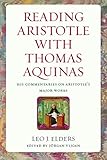Reading Aristotle with Thomas Aquinas : his commentaries on Aristotle's major works / Leo J. Elders ; edited by Jörgen Vijgen.
Material type: TextLanguage: English Original language: French Publisher: Washington, D.C. : The Catholic University of America Press, [2023]Copyright date: c2023Description: xi, 536 pagine ; 23 cmContent type:
TextLanguage: English Original language: French Publisher: Washington, D.C. : The Catholic University of America Press, [2023]Copyright date: c2023Description: xi, 536 pagine ; 23 cmContent type: - testo (txt)
- senza mediazione (n)
- volume (nc)
- 9780813235790
- Aristote et Thomas d'Aquin. Inglese
- BQ 6859.A3.E67E 2023
| Item type | Current library | Call number | Status | Barcode | |
|---|---|---|---|---|---|
 Opera (Magaz.)
Opera (Magaz.)
|
Biblioteca "Angelicum" Pont. Univ. S.Tommaso d'Aquino Temporary Library | BQ 6859.A3.E67E 2023 (Browse shelf(Opens below)) | Available | 0030219501 |
Browsing Biblioteca "Angelicum" Pont. Univ. S.Tommaso d'Aquino shelves, Shelving location: Temporary Library Close shelf browser (Hides shelf browser)
| No cover image available |

|

|

|

|

|

|
||
| BQ 6858.E73.Q48 2017 Le cri de Job : essai d'interprétation de l'Expositio super Iob ad litteram de Saint Thomas d'Aquin / | BQ 6858.E73.R43 2020 Reading Job with St. Thomas Aquinas / | BQ 6858.E75 L65 The literal exposition on Job : a scriptural commentary concerning providence / | BQ 6859.A3.E67E 2023 Reading Aristotle with Thomas Aquinas : his commentaries on Aristotle's major works / | BQ 6859.A4.E69 2007 Commentary on Aristotle's Posterior analytics / | BQ 6859.A6.E5 1999 A commentary on Aristotle's De anima / | BQ 6859.A6I7 2012 Lo specchio dell'anima : la sentenza di Tommaso d'Aquino sul "De anima" di Aristotele / |
Translation of: Aristote et Thomas d'Aquin : Les commentaires sur les oeuvres majeures d'Aristote.
Include bibliografia e indice.
"Reading Aristotle with Thomas Aquinas: His Commentaries on Aristotle's Major Works offers an original and decisive work for the understanding of the thought of Thomas Aquinas. For decades his commentaries on the major works of Aristotle have been the subject of lively discussions. Are his commentaries faithful and reliable expositions of the Stagirite's thought or do they contain Thomas's own philosophy and are they read through the lens of Thomas's own Christian faith and in doing so possibly distorting Aristotle? In order to be able to provide clarity and offer a nuanced response to this question, a careful study of all the relevant texts is needed. This is precisely what the author sets out do to in this work. Each chapter is devoted to one of the twelve commentaries Thomas wrote on major works of Aristotle including both his massive and influential commentaries on the Metaphysics, Physics and Nicomachean Ethics as well as lesser known commentaries. Elders places Thomas's commentary in its historical context, reviews the Greek, Arabic and Latin translation and reception of Aristotle's text as well as contemporary interpretations thereof and presents the reader with a thorough presentation and analysis of the content of the commentary, drawing attention to all the places where Thomas intervenes and makes special observations. In this way the reader can study Aristotle's treatises with Thomas as guide. The conclusion reached is that Thomas's commentaries are a masterful and faithful presentation of Aristotle's thought and of that of Thomas himself. Thomas's Christian faith does not falsify Aristotle's text, but gives occasionally an outlook at what lies behind philosophical thought".


